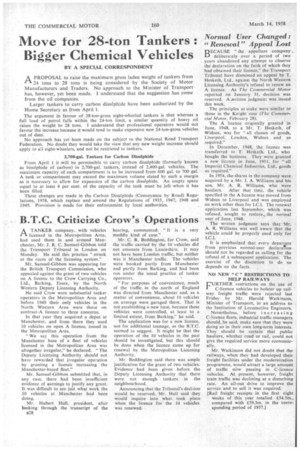B.T.C. Criticize Crow's Operations
Page 62

If you've noticed an error in this article please click here to report it so we can fix it.
ATANKER company, with vehicles licensed in the Metropolitan Area, had used them in and around Manchester, Mr. J. R. C. Samuel-Gibbon told the Transport Tribunal in London on Monday. He said this practice "struck at the roots of the licensing system."
Mr. Samuel-Gibbon was appearing for the British Transport Commission, who appealed against the grant of two vehicles on A licence to the Crow Carrying Co., Ltd., Barking, Essex, by the North Western Deputy Licensing Authority.
He said Crow were substantial tanker operators in the Metropolitan Area and before 1949 their only vehicles in the North Western Area were those on contract-A licence to three concerns.
In that year they acquired a depot at Manchester, and from there they used 10 vehicles on open A licence, issued in the Metropolitan Area, "We say this operation from the Manchester base Of a fleet of vehicles licensed in the Metropolitan Area was altogether irregular," he declared. "The Deputy Licensing Authority should not have rewarded that irregular operation by granting a licence increasing the Manchester-based fleet."
Mr. Samuel-Gibbon submitted that, in any case, there had been insufficient evidence of earnings to justify any grant. It was difficult to see just what work the 10 vehicles at Manchester had been doing.
Mr. Hubert Hull, president, after looking through the transcript of the
1,28 ' hearing, commented: "It is a very muddly kind of case."
Mr. C. R. Beddington, for Crow, said the traffic carried by the 10 vehicles did not emanate from Lancashire. It may not have been London traffic, but neither was it Manchester traffic. The vehicles were booked partly from Manchester and partly from Barking, and had been run under the usual practice of tanker operators.
"For purposes of convenience, much of the traffic in the north of England was directed from Manchester and, as a matter of convenience, about 10 vehicles on average were garaged there. That is not establishing a new base, because these vehicles were controlled, at least to a limited extent, from Barking," he said.
The application was for a new licence, not for additional tonnage, as the B.T.C. seemed to suggest. It might be that the operation of the 10 vehicles in. the past should be investigated, but this should be done when the licence came up for renewal by the Metropolitan Licensing Authority.
Mr. Beddington said there was ample justification for the grant of two vehicles. Evidence had been given before the Deputy Licensing Authority that there were not enough tankers in the neighbourhood.
Announcing that the Tribunal's decision would be reserved, Mr. Hull said they would inquire into what took place when the licence for the 10 vehicles was renewed.












































































































































































